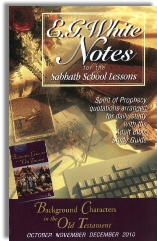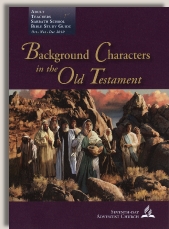|
||||||||||||||
Commentary on "Rizpah: The Influence of Faithfulness"
Day 2: Sunday, November 21, 2010 - The King's Concubine
Overview
Today, the Lesson gives a brief history of Rizpah and some background information on the lives of concubines. Other characters in the story are also introduced, such as Ishbosheth, the last remaining son of Saul who would be king with general Abner’s help. Rizpah evidently was never a slave, for she was the daughter of Aiah. Her fate is completely out of her control, though her actions later have a great effect on the nations of Judah and Israel.
Observations
Rizpah’s hope of an inheritance with Saul is as fragile as the reign of Ishbosheth. The house of Saul is diminishing, while the house of David is becoming “greater and greater, for the Lord, the God of hosts, was with him (II Sam. 5:10).” Neither the mighty David nor helpless Rizpah could have ultimate control over these events. The Lesson attempts to speculate on what would have happened here if any of the characters had chosen differently. Regardless of human choices, the house of David was to increase, for this was the Lord’s doing.
The Lesson fails to mention some important background to this story, which begins in Joshua 9. The Gibeonites (also known as the Hivites) were brought into the nation of Israel 400 years before under strange circumstances. After the Israelites conquered the city of Jericho and the town of Ai, the nation of Gibeon would probably have been next to fall. The Gibeonites were very aware of this, and though they were a nation of warriors, they had seen the supernatural power behind Israel’s conquests. They heard the tales and feared this Yahweh, deciding that it was no use fighting against Israel.
Instead of directly approaching Israel’s leaders to sue for peace, they opted for a clever ruse to trick Israel into a covenant. This was probably motivated by the fact that Israel did not make treaties with the Canaanites, for they had been commanded in Deut. 20:10-15 to only make terms of peace with distant cities. Nearby cities were to be utterly destroyed, and the Hivites were specifically mentioned as chosen for destruction (vs. 17). So a delegation of Gibeonites packed their donkies with moldy provisions, wore old tattered clothing, and approached the Israelite camp. They claimed to have come from a far country, and begged to make a covenant. They travelled to make peace because of the “name of the LORD your God, for we have heard a report of Him,” and all His great acts for Israel. Under Joshua’s leadership, the Israelites agreed to this in ignorance of their true identity. The scripture notes that they “did not ask counsel from the Lord (Joshua 9:14).” Joshua pronounced a curse upon them, however, and proclaimed that from that time forward, they could only be Israel’s servants, gathering wood and water for the house of God (Joshua 9:21-23).
Soon after, when the Israelites learned they had been tricked, wanted to kill the Gibeonites. However, Joshua and the other leaders commanded that they “let them live, lest wrath be upon us, because of the oath…” and the Gibeonite covenant stood. When their Canaanite neighbors learned of this covenant with Israel, 5 kings of the Amorites launched a furious assault against Gibeon. Surrounded by a great army, they cried out for help. Israel came to the rescue, and with the help of giant hailstones, routed the armies of all five kings in a great slaughter. This battle proved to be pivotal for Israel’s ultimate taking of southern Palestine (WebBible Encyclopedia at http://www.christiananswers.net/dictionary/gibeon.html).
By means of a rashly made covenant by Joshua, God kept His own covenant, and advanced His own purposes for Israel. The Gibeonites remained within Israel’s borders as their servants for 400 years, under the protection of Israel and Israel’s God, while working for the temple services. Here we see a shadow of better things to come. The Gibeonites were excluded from citizenship in Israel, without hope and without God in the world (Eph. 2:12,13), but these Gentiles were brought near into Israel through their covenant. By serving the temple they participated in worship of the true God. Joshua pronounced the forced temple work as a curse, but God meant it for good.
Knowing this history of Gibeon, we can better understand what transpires in II Samuel 21 between this group of unwanted Gentiles and the houses of Saul and David.
Summary
- The house of David was ordained by God to increase, as God had ultimate control.
- Four hundred year before, the Gibeonites had escaped destruction by tricking the Israelites into a covenant of peace. This covenant included servitude for the temple.
- When the Gibeonites were attacked by Amorites, Israel rescued them, and this victory was critical to their success in possessing Canaan.
- God’s covenant purposes for Israel were brought about through the Gentile Gibeonites. This foreshadowed the new covenant protections that were opened to all Gentiles.
Copyright 2010 BibleStudiesForAdventists.com. All rights reserved. November 18, 2010. This website is published by Life Assurance Ministries, Glendale, Arizona, USA, the publisher of Proclamation! Magazine. Contact email: BibleStudiesForAdventists@gmail.com.
The Sabbath School Bible Study Guide and the corresponding E.G. White Notes are published by Pacific Press Publishing Association, which is owned and operated by the Seventh-day Adventist church. The current quarter's editions are pictured above.
Official Adventist Resources
Standard Edition Study Guide Week 9
Teacher's Edition Study Guide Week 9
Easy Reading Edition Study Guide Wk 9
Search the Complete Published Ellen G. White Writings


